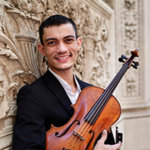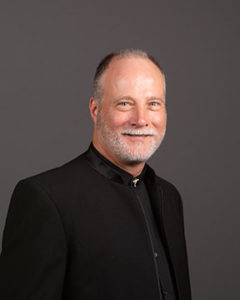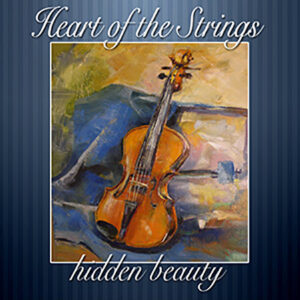Program
Florence Price – Concert Overture No. 2 (1943)
Based on three spirituals, “Go Down Moses,” “Ev’ry Time I Feel the Spirit,”
“Nobody Knows the Trouble I’ve Seen”
Joseph Haydn – Symphony No. 88 in G Major
York Bowen – Viola Concerto in C Minor, Op. 25
Julian Tello Jr., viola soloist
Florence Price – Concert Overture No. 2
For many of us, our introduction to the remarkable music of Florence Price (1887-1953) is a regrettably recent experience. Florence Smith grew up in Little Rock, Arkansas, in a mixed-race family. She studied music from early youth and went on to earn degrees from the New England Conservatory. She returned to the South and married Thomas Price, but a growing Jim Crow climate drove them to Chicago. There she encountered and found artistic stimulus from the Chicago Black Renaissance, which included writers, artists, and musicians.
Price studied at several Chicago universities and worked seriously on composition. Her first symphony won a Wanamaker Foundation Award and was performed in 1933 by the Chicago Symphony, the first work by a Black woman to be performed by a major American orchestra. During the 1930s and 1940s, many of her works were performed by orchestras in the region, and Price was inducted into ASCAP in 1940. She died in 1953 at age 66.
Although Price had composed a massive amount of music (four symphonies, four concerti, numerous songs, chamber, piano, and organ works), her compositions slipped from public attention for several decades. Long after her death, a trove of her compositions was found in 2009 in a small house where she typically summered. This large body of work, including her acclaimed Fourth Symphony, introduced the music world anew to a distinctive musician who blended the language of the classical European tradition with strong elements of her African American idiom and its rhythmic focus.
Price’s Concert Overture No. 2 is based on three familiar spirituals, “Go Down, Moses,” “Ev’ry Time I Feel the Spirit,” and “Nobody Knows the Trouble I’ve Seen.” Here the spiritual melodies are all rendered clearly and their themes are also intertwined with one another in masterful fashion.
Haydn – Symphony No. 88 in G Major
Franz Josef “Papa” Haydn (1732-1809), that prolific, long-lived model of the productive musician, composed 104 symphonies over his career. His musical talent was identified early, and he was sent from home at six for training, ultimately arriving at St. Stephen’s Cathedral in Vienna, an important musical center. His career in the boys’ choir, however, was curtailed by his voice changing and tendency to pranks. Thereafter, Haydn spent some years piecing together a meager living as a performer, while studying composition largely independently.
Haydn’s early compositions earned him attention and led to full-time employment as musical director, first for a Count Morzin and then, for nearly 30 years, for the wealthy Esterhazy family. There, in rural Austria and then Hungary, Haydn conducted a small orchestra, performed, and composed. In time, he acquired the right to receive his own commissions and to own those compositions, which saw him turning from the operas favored by Esterhazy to chamber music and symphonies. His contributions to the development of the string quartet and the symphony have earned him the title of the “father” of these forms, though their parentage was much broader.
In 1790, Haydn’s role with the Esterhazys ended (though later resumed under easier terms), but he now had an international reputation, especially popular in England. Two extended visits there were creative and enjoyable times for him, inspiring some of his finest late symphonies. In Vienna too, he was lionized. Having begun as a young composer as the Baroque style was fading, Haydn, in his long career gave shape to the Classical style, with its attention to balance and proportion, a music often enlivened by his wit and sense of humor. Symphony #88 is a later work that offers us these traits, a jewel in his tiara of 104 gems.
intermission
York Bowen – Viola Concerto in C Minor, Op. 25 (viola soloist Julian Tello)
Edwin York Bowen (1884-1961) was a highly praised English composer in the early part of the twentieth century, but his name is largely lost in our time as a contemporary of Elgar, Holst, and Vaughan Williams. However, he was a prolific composer of symphonies and concerti as well as a distinguished pianist and talented performer on other instruments.
Bowen’s musical talents were recognized early and supported. He completed studies at the Royal Academy of Music, where later he served as professor. His works included many for individual instruments (piano, horn, violin, viola) either as solos, concerti, or in small chamber ensembles. Bowen’s preference for the tone qualities of the viola was well known, and the C Minor concerto is one of his best-known works.
The years prior to the First World War witnessed Bowen’s greatest public recognition. In later years, his Romantic style, which fundamentally respects the diatonic idiom, whether major or minor, was seen by many, influenced by everything from jazz to 12-tone experimentalism, as old-fashioned. Only very late in his life, as well as after his death, did he receive further attention, but even today many of his compositions have not been published.

A native of San Antonio, TX, Julian Tello Jr began playing the viola at age 10 and made his solo debut with the Odysseus Chamber Orchestra in 2015. He received his Bachelor’s degree in Viola Performance from The Curtis Institute of Music in 2018, where he studied with Hsin-Yun Huang and Roberto Diaz. Prior to this, Julian studied with Dr. Misha Galaganov at Texas Christian University in Fort Worth, TX and with Dr. Jennifer Cahill-Clark at University of Texas in San Antonio. A freelance artist, Julian plays viola with the Chamber Orchestra of Philadelphia, the Waco Symphony and the McKinney Philharmonic and plays viola and violin as a regular substitute with the Dallas Symphony, Fort Worth Symphony, San Angelo Symphony, Irving Symphony, Plano Symphony, and the York Symphony in Pennsylvania. His previous associations include section viola with Camden-based group Symphony in C, Associate Concertmaster of the Garden State Philharmonic, section viola with the Las Colinas Philharmonic, Principal Viola with the Abilene Philharmonic, and Principal Viola with the Odysseus Chamber orchestra. He is a regular chamber music performer for the Mallery Recital Series at Rutgers University Camden, the Fever Candlelight Concert Series in multiple US cities, and has presented chamber music recitals at the Sibelius Academy in Helsinki with Curtis on Tour, aboard Holland America cruise ships with the Lincoln Center Stage piano quintet, and with the Zenos Quartet at Music from Angel Fire. When not out performing or playing the viola for his cat Sergei, Julian enjoys hiking, taking road trips, and eating adventurous foods while traveling the world.
 From the conductor:
From the conductor:
This concert features the exhilarating sound of the lesser known string instrument, the viola. York Bowen composed an exhilarating concerto for the instrument, and Curtis-trained San Antonio violist, Julian Tello, will perform. The concert will open with American composer Florence Price’s beautiful Concert Overture No. 2, containing music inspired by three Spirituals. Ms. Price was the first African-American woman to have an orchestral work played by a major American orchestra. And speaking of lesser known music—Haydn’s Symphony No. 88 is a spark of energy and beauty. One of his 104 symphonies, Haydn shows his masterful touch on the symphony genre he helped create, hence his title “Father of the Symphony.”
You will discover much beauty in this concert program—we hope to see you there!
Gene Dowdy, conductor & artistic director





